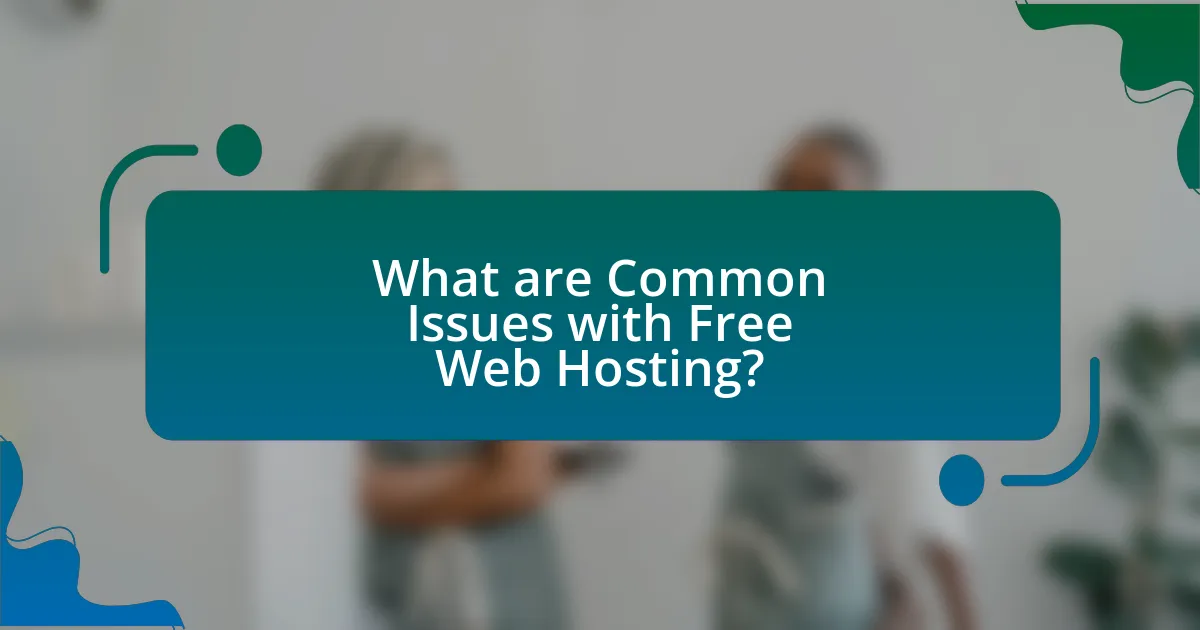Free web hosting is a cost-effective service that allows individuals and organizations to host websites without financial investment, typically offering limited resources and features. This guide provides an overview of free web hosting, comparing it to paid options, discussing its limitations, and outlining the advantages for beginners. Key topics include how to choose the right provider, common issues faced, and best practices for maximizing the experience. Additionally, the article covers the setup process, file management, and troubleshooting tips, making it a comprehensive resource for those looking to establish an online presence without incurring costs.

What is Free Web Hosting?
Free web hosting is a service that allows individuals or organizations to host their websites on the internet without incurring any costs. This type of hosting typically provides limited resources, such as storage space and bandwidth, and may include advertisements on the hosted site. Many free web hosting providers offer basic features suitable for personal projects or small websites, making it accessible for beginners who want to establish an online presence without financial investment.
How does Free Web Hosting differ from paid hosting?
Free web hosting differs from paid hosting primarily in terms of features, reliability, and support. Free hosting typically offers limited storage, bandwidth, and functionality, often displaying ads on user sites, while paid hosting provides more resources, enhanced performance, and customer support. For instance, a study by HostingAdvice found that paid hosting services can offer uptime guarantees of 99.9%, whereas free hosting often lacks such reliability, leading to potential downtime and slower loading speeds.
What are the limitations of Free Web Hosting services?
Free web hosting services have several limitations, including restricted storage space, limited bandwidth, lack of customer support, and the presence of advertisements. These services typically offer minimal disk space, often less than 1 GB, which can hinder the ability to host larger websites. Bandwidth limitations can restrict the number of visitors a site can handle, leading to slow loading times or downtime. Additionally, free hosting often lacks reliable customer support, making it difficult for users to resolve issues. Furthermore, many free hosting providers display ads on users’ websites, which can detract from the user experience and brand image.
What features are commonly offered in Free Web Hosting?
Free web hosting commonly offers features such as limited storage space, bandwidth, and subdomain usage. Typically, users receive around 1GB to 5GB of storage and bandwidth limits ranging from 1GB to 10GB per month. Additionally, free hosting often includes a subdomain (e.g., yoursite.freehost.com) instead of a custom domain. Many providers also offer basic website builders, email accounts, and limited customer support. These features are designed to allow users to create and manage simple websites without incurring costs, making it accessible for beginners.
Why would someone choose Free Web Hosting?
Someone would choose free web hosting primarily to minimize costs while establishing an online presence. Free web hosting services allow individuals and small businesses to create websites without financial investment, making it accessible for those with limited budgets. According to a survey by HostingAdvice, 70% of new website owners prefer free hosting options to test their ideas before committing to paid services. This approach enables users to evaluate the platform’s features and performance without financial risk, facilitating experimentation and learning in web development.
What are the advantages of using Free Web Hosting for beginners?
Free web hosting offers several advantages for beginners, primarily cost-effectiveness and ease of use. Beginners can create and manage websites without incurring expenses, allowing them to experiment and learn without financial pressure. Additionally, many free web hosting services provide user-friendly interfaces and templates, simplifying the website creation process. This accessibility enables beginners to focus on learning web development skills rather than dealing with complex technical setups. Furthermore, free hosting often includes basic support and community forums, which can be invaluable resources for newcomers seeking assistance.
How can Free Web Hosting help in learning web development?
Free web hosting can significantly aid in learning web development by providing a practical platform for hands-on experience without financial barriers. It allows learners to experiment with coding, design, and deployment of websites in a real-world environment. For instance, platforms like GitHub Pages and InfinityFree offer free hosting services that enable users to publish their projects, facilitating immediate feedback and iterative learning. This practical application reinforces theoretical knowledge, making it easier to grasp concepts such as HTML, CSS, and JavaScript. Additionally, free web hosting often includes access to community forums and resources, further enhancing the learning experience through collaboration and support.

How to Choose the Right Free Web Hosting Service?
To choose the right free web hosting service, evaluate the features, limitations, and support options of each provider. Key factors include storage space, bandwidth, uptime guarantees, and whether the service includes essential features like a website builder or email accounts. For instance, providers like InfinityFree offer unlimited storage and bandwidth, while others may impose strict limits. Additionally, consider the level of customer support available; some free services may lack adequate support, which can hinder your ability to resolve issues. Researching user reviews and comparisons can provide insights into the reliability and performance of different free hosting options.
What factors should you consider when selecting a Free Web Hosting provider?
When selecting a Free Web Hosting provider, consider factors such as storage space, bandwidth, uptime reliability, customer support, and advertising policies. Storage space and bandwidth determine how much data you can host and transfer, which is crucial for website performance. Uptime reliability is essential, as a provider with high uptime ensures your website remains accessible; many reputable providers offer at least 99.9% uptime. Customer support is important for resolving issues quickly, and providers with 24/7 support are preferable. Lastly, be aware of advertising policies, as some free hosts may place ads on your site, impacting user experience.
How important is customer support in Free Web Hosting?
Customer support is crucial in free web hosting as it directly impacts user experience and problem resolution. Users of free web hosting services often encounter technical issues or limitations that require assistance. Effective customer support can significantly reduce downtime and frustration, ensuring that users can maintain their websites without prolonged interruptions. According to a survey by Zendesk, 82% of consumers have stopped doing business with a company due to poor customer service, highlighting the importance of responsive support in retaining users.
What role does uptime play in choosing a Free Web Hosting service?
Uptime is a critical factor in selecting a free web hosting service because it directly impacts the availability and reliability of a website. High uptime percentages, typically above 99%, ensure that a website remains accessible to users, which is essential for maintaining traffic and user engagement. For instance, if a free web hosting service offers an uptime of only 90%, it means the website could be down for approximately 36.5 days in a year, significantly hindering business operations or personal projects. Therefore, evaluating uptime guarantees helps users choose a service that minimizes downtime and enhances overall performance.
What are the most popular Free Web Hosting services available?
The most popular free web hosting services available include InfinityFree, 000webhost, and AwardSpace. InfinityFree offers unlimited disk space and bandwidth, making it a favored choice among users. 000webhost provides a user-friendly interface and a free website builder, attracting beginners. AwardSpace stands out with its free domain hosting and email accounts, appealing to those looking for comprehensive features without cost. These services are widely recognized for their reliability and user-friendly features, making them suitable for individuals and small projects.
How do different Free Web Hosting services compare in terms of features?
Different free web hosting services vary significantly in features such as storage space, bandwidth, domain support, and customer support. For instance, InfinityFree offers unlimited disk space and bandwidth but does not support custom domains, while 000webhost provides 1 GB of storage and 10 GB of bandwidth with custom domain support. Additionally, Freehostia includes 250 MB of storage and 6 GB of bandwidth, along with a user-friendly control panel, but limits the number of hosted domains. These comparisons highlight that while some services prioritize storage and bandwidth, others focus on ease of use and domain flexibility, catering to different user needs.
What user reviews say about the top Free Web Hosting providers?
User reviews indicate that the top free web hosting providers often receive mixed feedback. Many users appreciate the cost-effectiveness and ease of use, highlighting platforms like InfinityFree and 000webhost for their user-friendly interfaces and no-cost services. However, reviews frequently mention limitations such as restricted bandwidth, lack of customer support, and potential downtime, particularly with providers like Freehostia and AwardSpace. Users also express concerns about the presence of ads on free plans, which can detract from the overall experience. Overall, while free web hosting can be a good starting point for beginners, users often recommend considering paid options for more reliability and features.

How to Set Up Your Free Web Hosting Account?
To set up your free web hosting account, first, choose a reputable free web hosting provider such as InfinityFree, 000webhost, or AwardSpace. After selecting a provider, visit their website and click on the sign-up or registration button. Fill out the required information, including your email address and a password, to create your account. Once registered, you will typically receive a confirmation email; follow the instructions in that email to verify your account. After verification, log in to your account dashboard, where you can set up your website by selecting a domain name, uploading files, or using a website builder provided by the host. This process is validated by the fact that most free hosting services follow a similar registration and setup procedure, ensuring users can easily create and manage their websites.
What are the steps to create an account with a Free Web Hosting provider?
To create an account with a Free Web Hosting provider, follow these steps: First, visit the website of the chosen Free Web Hosting provider. Next, locate and click on the “Sign Up” or “Create Account” button. Then, fill out the registration form with required information such as your name, email address, and password. After that, agree to the terms of service and privacy policy, if prompted. Finally, verify your email address through a confirmation link sent to your inbox, and your account will be activated. These steps are standard across most Free Web Hosting providers, ensuring a straightforward registration process.
How do you register a domain name with Free Web Hosting?
To register a domain name with Free Web Hosting, first, select a free web hosting provider that offers domain registration services, such as InfinityFree or 000webhost. After choosing a provider, create an account on their platform. Then, navigate to the domain registration section, where you can search for your desired domain name to check its availability. If the domain is available, follow the prompts to register it, which typically involves filling out your contact information and confirming the registration. Many free hosting services will automatically link the domain to your hosting account upon registration, allowing you to start building your website immediately.
What information is typically required during the sign-up process?
During the sign-up process for free web hosting, users typically need to provide personal information such as their name, email address, and sometimes a phone number. This information is essential for account creation, verification, and communication purposes. Additionally, users may be required to create a username and password to secure their account. Some platforms might also ask for demographic information or preferences to tailor services, but the core requirements remain focused on identity verification and account security.
How can you upload your website files to Free Web Hosting?
To upload your website files to Free Web Hosting, you typically use an FTP (File Transfer Protocol) client or the hosting provider’s web-based file manager. FTP clients like FileZilla allow you to connect to your hosting account using the server address, username, and password provided by your hosting service. Once connected, you can drag and drop your website files from your local computer to the server’s designated directory, usually named ‘public_html’ or ‘www’. This method is widely used because it efficiently transfers multiple files and folders at once, ensuring your website is live and accessible online.
What tools can you use to transfer files to your Free Web Hosting account?
You can use FTP clients, web-based file managers, and command-line tools to transfer files to your Free Web Hosting account. FTP clients like FileZilla and WinSCP allow users to connect to their hosting server and upload files efficiently. Web-based file managers provided by hosting services enable direct uploads through a browser interface. Additionally, command-line tools like SCP (Secure Copy Protocol) can be utilized for file transfers, especially for users comfortable with terminal commands. These tools are widely recognized for their effectiveness in managing file transfers in web hosting environments.
How do you manage your website files once uploaded?
To manage website files once uploaded, utilize a file management system or FTP client to organize, edit, and delete files as needed. This allows for efficient navigation through directories, ensuring that files are structured logically for easy access. Regularly back up files to prevent data loss, and implement version control to track changes. According to a study by the Web Hosting Industry Review, effective file management can reduce downtime and improve website performance, highlighting the importance of maintaining an organized file structure.

What are Common Issues with Free Web Hosting?
Common issues with free web hosting include limited storage and bandwidth, lack of customer support, and the presence of advertisements on hosted sites. Limited storage and bandwidth can restrict website functionality and growth, as many free hosting services impose strict caps that can lead to slow loading times or downtime. The lack of customer support means users may struggle to resolve technical issues, as many free services do not offer reliable assistance. Additionally, advertisements placed by the hosting provider can detract from the user experience and diminish the professional appearance of a website. These factors collectively hinder the effectiveness and reliability of free web hosting solutions.
What challenges might you face when using Free Web Hosting?
Using free web hosting can present several challenges, including limited storage and bandwidth, which can restrict website performance and scalability. Many free hosting services impose strict limits on data transfer and disk space, making it difficult for websites to handle high traffic or store large files. Additionally, free web hosting often comes with advertisements, which can detract from the user experience and professional appearance of a website. Security is another concern, as free hosting providers may not offer robust security measures, leaving websites vulnerable to attacks. Furthermore, customer support is typically minimal or non-existent, making it challenging for users to resolve issues quickly. Lastly, the lack of control over server configurations can hinder customization and optimization efforts, limiting the overall functionality of the website.
How can you troubleshoot common problems with Free Web Hosting?
To troubleshoot common problems with free web hosting, first identify the specific issue, such as website downtime, slow loading speeds, or file upload errors. For downtime, check the hosting provider’s status page or contact support to confirm if there are server issues. For slow loading speeds, optimize images and minimize code, as free hosting often has limited resources. If encountering file upload errors, ensure that file sizes do not exceed the host’s limits and that the correct file types are being used. These steps are effective because they address the most frequent issues faced by users of free web hosting services, which often have constraints on resources and support.
What are the best practices to avoid issues with Free Web Hosting?
To avoid issues with free web hosting, users should select reputable providers, regularly back up their data, and understand the limitations of the service. Reputable providers often offer better uptime, customer support, and security features, reducing the risk of downtime or data loss. Regular backups ensure that users can restore their websites in case of data corruption or loss, which is crucial since free hosting services may not provide reliable recovery options. Additionally, understanding limitations such as bandwidth caps, storage limits, and potential ads on the site helps users manage their expectations and plan accordingly.
What are the limitations of Free Web Hosting that users should be aware of?
Free web hosting has several limitations that users should be aware of, including restricted storage space, limited bandwidth, and lack of customer support. These services often impose caps on the amount of data that can be stored and transferred, which can hinder website performance and accessibility. Additionally, free hosting typically includes advertisements on users’ sites, which can detract from the user experience and brand image. Security features are often minimal, leaving websites vulnerable to attacks. Furthermore, users may face restrictions on the types of content they can host and may not have access to essential features like custom domain names or email accounts. These limitations can significantly impact the functionality and professionalism of a website.
How do bandwidth and storage limits affect your website performance?
Bandwidth and storage limits directly impact website performance by restricting the amount of data that can be transmitted and stored. Limited bandwidth can lead to slower loading times, as the server may struggle to deliver content to users efficiently, especially during peak traffic periods. For instance, if a website exceeds its bandwidth allocation, users may experience downtime or be unable to access the site altogether. Similarly, insufficient storage limits can hinder the ability to host necessary files, images, and databases, resulting in a degraded user experience. Research indicates that websites with loading times exceeding three seconds can lose up to 40% of visitors, highlighting the critical role of adequate bandwidth and storage in maintaining optimal performance.
What are the implications of advertising on Free Web Hosting services?
Advertising on Free Web Hosting services primarily leads to revenue generation for the hosting providers while impacting user experience and website functionality. Free web hosting platforms often display ads on users’ websites, which can detract from the site’s professionalism and user engagement. According to a study by HostingAdvice, 70% of users find websites with excessive advertising less trustworthy, indicating that ads can negatively affect visitors’ perceptions. Additionally, the presence of ads can limit the customization options available to users, as many free hosting services impose restrictions on design and content to accommodate advertising. This reliance on advertising can also lead to potential data privacy concerns, as users may not be fully aware of how their information is being utilized by advertisers.
What tips can help you maximize your experience with Free Web Hosting?
To maximize your experience with free web hosting, choose a provider that offers reliable uptime and sufficient bandwidth. Reliable uptime ensures your website remains accessible, while adequate bandwidth prevents slow loading times during traffic spikes. For instance, providers like InfinityFree and 000webhost are known for their solid performance metrics. Additionally, utilize the available resources, such as tutorials and community forums, to enhance your understanding of the platform. Engaging with these resources can lead to better website management and troubleshooting skills. Lastly, regularly back up your website data, as free hosting services may not guarantee data recovery, ensuring you do not lose valuable content.


